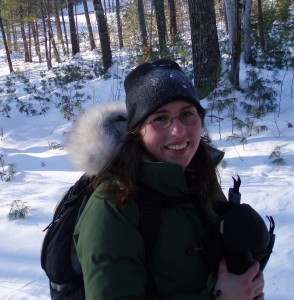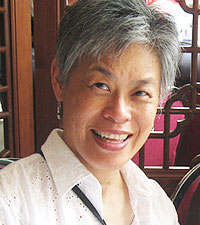Tuesday, May 8, 2012
7:30 PM
Bats vs. Moths: an evolutionary arms race
MCZ 101, 26 Oxford Street, Harvard University

Jessica Walden-Gray
Jessica Walden-Gray, Boston University
Bats and moths have been trapped in an evolutionary arms race for over 50 million years. Bats “see” the sensory world in sound and insects have evolved an array of tools to exploit echolocation to stay one wing beat ahead of bats. Moths have adapted ears and ultrasonic cries to avoid bats and jam bat sonar. Ms. Walden Gray will focus on the adaptations of tiger moths to avoid bat predation and introduce a species of tiger moth that has co-opted its bat ears for sexual communication.
The talk is free and open to the public. The meeting is readily accessible via public transportation. Parking is available in the Oxford Street Garage with advance arrangement, as described here, or (usually but not always) at spaces on nearby streets. Everyone is also welcome to join us for dinner before the talk (beginning at 6:00 PM) at the Cambridge Common restaurant on Massachusetts Avenue.
CEC meetings are held the second Tuesday of the month from October through May. The evening schedule typically includes an informal dinner (6 to 7 PM) followed by our formal meeting (7:30 – 9:00 PM). The latter begins with club business and is followed by a 50 minute entomology related presentation. Membership is open to amateur and professional entomologists.
Tuesday, April 10, 2012
7:30 PM
Consequences of multiple species invasions: a native butterfly confronts exotic plants and parasitoids
MCZ 101, 26 Oxford Street, Harvard University

Dr. Frances Chew
Frances Chew, Professor of Ecology, Tufts University
Exotic invasive species pose challenges to native species encountering them
for the first time. In the 1800s, the native mustard white butterfly flew
in Harvard Yard. Since then it has been affected by serial invasions of
garlic mustard, parasitoid biological control agents for the related
cabbage white butterfly, and other exotic plant species. Despite its
current threatened status in Massachusetts, the ecological stage is now set
for recovery and population growth of this butterfly – an unintended
consequence of recent species introductions.
The talk is free and open to the public. The meeting is readily accessible via public transportation. Parking is available in the Oxford Street Garage with advance arrangement, as described here, or (usually but not always) at spaces on nearby streets. Everyone is also welcome to join us for dinner before the talk (beginning at 6:00 PM) at Cambridge Common restaurant.
CEC meetings are held the second Tuesday of the month from October through May. The evening schedule typically includes an informal dinner (6:00 to 7:15 PM) followed by our formal meeting (7:30 – 9:00 PM). The latter begins with club business and is followed by a 50 minute entomology related presentation. Membership is open to amateur and professional entomologists.




